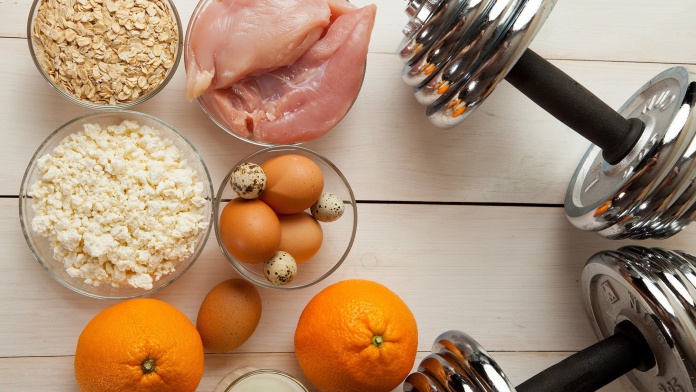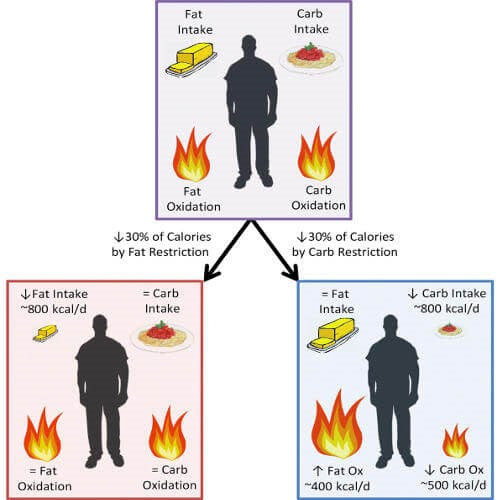
Why the fitness industry is wrong on weight loss
When aiming for better body composition you have to eat certain foods to burn fat, avoid certain foods that store fat and partake in fat burning exercise right? Wrong! There’s a lot of myths and misunderstandings surrounding fat loss, body composition or weight (muscle) gain but much of this just overcomplicates it all. This blog should help to demystify some of this commonly repeated nonsense for you.
First off, let’s define what we mean by ‘body composition’. It’s basically a fancy way of saying ‘weight management’, but many fitness professionals use it because they are more focussed on the aesthetic elements. They like to look good and they want you to look good too, so they call themselves a body composition coach because they teach their clients how to lose fat and build muscle for a more aesthetically pleasing physique. That’s fine, there’s nothing wrong with that at all. The goal, basically is to lose excess body fat and, if you are training to increase muscle mass then the chances are that your weight (unless you are very overweight) won’t reduce too much anyway. So, instead of saying weight loss we say fat loss or, more specifically, body composition (sometimes also referred to as body recomposition if weight is unchanged but body fat is reduced). Make sense? Cool, let’s move on.
Why exercise doesn’t burn fat
Sorry folks, trainers especially, but the fitness industry is wrong on this. Exercise is actually a pretty shite tool for fat loss. Kind of like a light sabre is pretty awesome for cutting off a person’s arm and cauterizing the wound in the process, but it’s rubbish for removing the tyre from your mountain bike. Any article you read that’s titled along the lines of ‘5 exercises to burn belly fat’ is bollocks. I’m afraid that it’s one of those things that has been repeated so many times that no-one questions it anymore. Sure, exercise uses energy, so you are burning calories but that doesn’t necessarily translate to reductions in body fat. Think about it, if you eat a flapjack that comes in at around 450kcals, how much exercise will it take to burn that off? An hour on a recumbent cycle maybe? A 5k jog, 90-minutes of heavy weight lifting?
Now do you see why people lose motivation? They start off exercising, they think the weight will fall off… it doesn’t, they lose motivation and then eat all the cake because they are emotional about their failure. It’s not their fault, the message put out by the fitness industry is wrong. Exercising for weight loss is really inefficient.
But, because of this message, when most people hit a weight loss plateau what do they do? They increase their activity levels. This isn’t a finite mechanism, sooner or later you will reach a point at which you simply can’t do more exercise. In other words, if your scales aren’t moving, adding in yet another spin class or HIIT session isn’t going to help. In fact, it’s likely to put your body under more stress and create new problems.
Don’t believe me? Watch this short video
Don’t take that to say that you shouldn’t exercise though, exercise is REALLY important for your health. Our bodies evolved to be able to tolerate an exceptional amount of activity, a combination of steady state cardiovascular activities like walking or jogging. Shorter bursts of high intensity activity like sprinting and occasionally lifting some heavy stuff.
If you don’t do these things on a regular basis, you will develop various physical dysfunctions, from weak core and bad posture to poor flexibility, to hypertension, insulin resistance and increased risk of cardiovascular disease (CVD).
A typical workout might burn anything from 150-500kcals depending on the intensity you train at. Endurance based training like long trail runs or very long-distance bike rides may burn 2-3,000kcals but, if you walk 10,000 steps per day you will burn between 400 and 500kcals without even noticing it.
A couple of recent studies highlighted just how important exercise is.
A large study released by the University of Glasgow in April 2017 (1) observed 263,450 people over 5 years. They found that the risk of all-cause mortality and rates of cardiovascular disease (CVD) were over 50% lower in people who commuted to work by bike. Interestingly, diet and body composition didn’t seem to play a role in this research. It was simply the act of getting out of breath for moderate lengths of time each day that seemed to do it. Did we really needed any more reasons to believe that cycling is awesome?
Another recent cohort study from 2016 by Pekka Oja et al (2) Observed 80,306 individuals in Scotland and England over 10 years. Active participants were shown to have greatly reduced ‘all-cause mortality rates’ over their sedentary counterparts. The researchers even went as far as to identify the ‘healthiest’ sports.
All-cause mortality:
- Cycling -15%
- Aerobics -27%
- Swimming -28%
- Racquet sports -47%
Cardiovascular disease mortality:
- Aerobic sports -36%
- Swimming -41%
- Racquet sports -56%
In this study BMI was unchanged, so again, playing sport and being active alone made no difference to body composition but had huge implications for improving health.
A 2010 study by N. Owen et al (3) observed that too much sitting and general sedentary living could be a massive contributor to many instances of metabolic illness. Limiting the length of time spent sitting is essential, even when factoring in focussed exercise time those who sat less through the day were healthier. Not an easy problem to solve if you are one of the many office bound commuters.
So, we can see that being active is important and that being sedentary is bad so do more exercise and, if you can, get yourself on the cycle to work scheme.
I feel that it’s worth mentioning also, that exercise and playing sport are great for reducing stress and also for giving your life a little more purpose. Goals that are solely focussed on hitting targets on the scales or looking a certain way aren’t meaningful enough to us on an intrinsic level. Therefore, I would always encourage a client to focus on lifestyle improvements, health improvements and exercising to compliment sporting goals. This will make adherence easier, make exercise more fun and the aesthetics tend to take care of themselves after that. Your workouts, after-all, should be fun and not some form of self-flagellation style punishment.
But, exercise isn’t everything.
Weight management is all about controlling what goes into your mouth.
Let food be thy tool for weight loss
I have explained why exercise isn’t great for helping with weight loss but is excellent for supporting your health, so how do you lose body fat? You eat less food, or more specifically, you consume less energy from the food that you eat.
There is no doubt that you should be consuming a healthy diet consisting of mostly single ingredient foods – eat like an adult as Dan John would say – but if you want to lose weight you have to be in an energy deficit. I wrote about this some time ago
While eating a healthy diet is important for supporting health, just as much as exercising is, don’t get fooled into thinking that food can replace mainstream medicine because it can’t. But, if you eat 5-7 portions of vegetables and 2-3 portions of fruit per day, as well as hitting your macronutrient needs, staying hydrated and exercising regularly, you’ll be far less likely to need medicine.
Anyway, energy balance is pretty important, especially if you want to lose weight. No, not cutting out fats, or cutting out carbs or only drinking juiced kale and lemon rind, but putting fewer calories into your body than you use. There was an interesting study done by Kevin Hall in 2015, which used a metabolic ward to draw data from two groups, a low-fat group and a low carbohydrate group (4).

What they found was as follows:
- Cutting carbohydrates increased net fat oxidation, but cutting fat by equal calories had no effect
- Cutting fat resulted in more body fat loss as measured by metabolic balance
- Mathematical model simulations predicted small long-term differences in body fat (the fat loss was actually tiny)
What does this mean to you? It makes little difference which macronutrient you cut down on so long as you are in an energy deficit.
Actor Jonah Hill, when asked about his impressive weight loss said, “I started physically running instead of emotionally running.” But, ultimately, he saw a nutritionist who taught him about nutrition and how to develop better habits and attitudes around food intake. He admits that when he listed his favourite foods it read like the menu of a 6-year old’s birthday party. So, as I always say, develop the sense of self-worth required to invest in yourself.
Summary
So, there you have it. Exercise is pretty useless as a weight loss tool, but pretty much non-negotiable in terms of the positive health effects.
Weight management is all about controlling what goes into your mouth. You don’t have to massively restrict yourself and if you are exercising regularly you can actually eat more food while still losing weight, so long as calories are controlled.
Play a sport and exercise to improve your performance, eat to fuel your sport, relax the urgency for weight loss and just enjoy your sport. This removes the stress from any body composition goals and gives your life more meaning.
Allow adequate recovery from exercise, get your sleep on point, manage any of the stress inducers in your life (which sport and exercise can help with) just be consistent.
If you are a coach or trainer, this is the kind of message you ought to be giving to your clients, not the old “do back to back studio classes and smash yourself to pieces, because sweat is your fat crying” kind of crap we hear so much of.
If you are an enthusiast and haven’t yet found your sport or activity push yourself outside of your comfort zone and start trying new things. You never know, you might discover that open water swimming is your thing more than circuit training or that CrossFit becomes your new passion.
If you are already doing these things and want to be a part of a like-minded community then join my private Facebook group for recreational athletes.
You don’t have to be any good, I’m not!